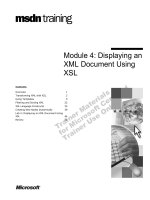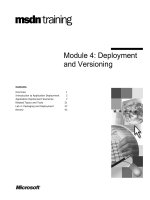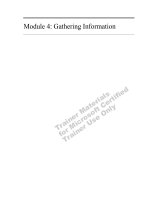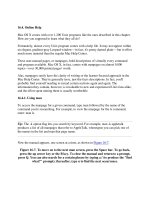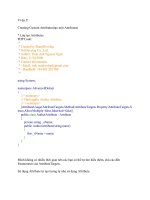Tài liệu C# 4.0 HOW-TO doc
Bạn đang xem bản rút gọn của tài liệu. Xem và tải ngay bản đầy đủ của tài liệu tại đây (5.14 MB, 670 trang )
ptg
800 East 96th Street, Indianapolis, Indiana 46240 USA
BEN WATSON
C# 4.0
HOW-TO
ptg
C# 4.0 How-To
Copyright © 2010 by Pearson Education, Inc.
All rights reserved. No part of this book shall be reproduced, stored in a
retrieval system, or transmitted by any means, electronic, mechanical,
photocopying, recording, or otherwise, without written permission from the
publisher. No patent liability is assumed with respect to the use of the
information contained herein. Although every precaution has been taken in
the preparation of this book, the publisher and author assume no responsi-
bility for errors or omissions. Nor is any liability assumed for damages
resulting from the use of the information contained herein.
ISBN-13: 978-0-672-33063-6
ISBN-10: 0-672-33063-6
Library of Congress Cataloging-in-Publication Data
Watson, Ben, 1980–
C# 4.0 how-to / Ben Watson.
p. cm.
Includes index.
ISBN 978-0-672-33063-6 (pbk. : alk. paper) 1. C# (Computer program
language) I. Title.
QA76.73.C154W38 2010
005.13’3—dc22
2010002735
Printed in the United States of America
First Printing March 2010
Trademarks
All terms mentioned in this book that are known to be trademarks or
service marks have been appropriately capitalized. Sams Publishing cannot
attest to the accuracy of this information. Use of a term in this book
should not be regarded as affecting the validity of any trademark or service
mark.
Warning and Disclaimer
Every effort has been made to make this book as complete and as accu-
rate as possible, but no warranty or fitness is implied. The information
provided is on an “as is” basis. The author and the publisher shall have
neither liability nor responsibility to any person or entity with respect to any
loss or damages arising from the information contained in this book.
Bulk Sales
Sams Publishing offers excellent discounts on this book when ordered in
quantity for bulk purchases or special sales. For more information, please
contact
U.S. Corporate and Government Sales
1-800-382-3419
For sales outside of the U.S., please contact
International Sales
Editor-in-Chief
Karen Gettman
Executive Editor
Neil Rowe
Acquisitions Editor
Brook Farling
Development Editor
Mark Renfrow
Managing Editor
Kristy Hart
Project Editor
Lori Lyons
Copy Editor
Bart Reed
Indexer
Brad Herriman
Proofreader
Sheri Cain
Technical Editor
Mark Strawmyer
Publishing
Coordinator
Cindy Teeters
Designer
Gary Adair
Compositor
Nonie Ratcliff
ptg
Contents at a Glance
Introduction 1
Part I: C# Fundamentals
1 Type Fundamentals 7
2 Creating Versatile Types
27
3 General Coding
45
4 Exceptions
63
5 Numbers
77
6 Enumerations
99
7 Strings
109
8 Regular Expressions
131
9 Generics
139
Part II: Handling Data
10 Collections 155
11 Files and Serialization
177
12 Networking and the Web
201
13 Databases
237
14 XML
261
Part III: User Interaction
15 Delegates, Events, and Anonymous Methods 279
16 Windows Forms
295
17 Graphics with Windows Forms and GDI+
329
18 WPF
365
19 ASP.NET
401
20 Silverlight
443
Part IV: Advanced C#
21 LINQ 461
22 Memory Management
473
23 Threads, Asynchronous, and Parallel Programming
491
24 Reflection and Creating Plugins
519
25 Application Patterns and Tips
529
26 Interacting with the OS and Hardware
575
27 Fun Stuff and Loose Ends
597
A Essential Tools
621
Index
633
ptg
Table of Contents
Introduction 1
Overview of C# 4.0 How-To
1
How-To Benefit from This Book
1
How-To Continue Expanding Your Knowledge
3
Part I: C# Fundamentals
1 Type Fundamentals 7
Create a Class
8
Define Fields, Properties, and Methods
9
Define Static Members
10
Add a Constructor
11
Initialize Properties at Construction
12
Use
const and readonly 13
Reuse Code in Multiple Constructors
14
Derive from a Class
14
Call a Base Class Constructor
15
Override a Base Class’s Method or Property
16
Create an Interface
19
Implement Interfaces
19
Create a Struct
21
Create an Anonymous Type
22
Prevent Instantiation with an Abstract Base Class
23
Interface or Abstract Base Class?
24
2 Creating Versatile Types 27
Format a Type with
ToString() 28
Make Types Equatable
32
Make Types Hashable with
GetHashCode() 34
Make Types Sortable
34
Give Types an Index
36
Notify Clients when Changes Happen
38
Overload Appropriate Operators
39
Convert One Type to Another
40
Prevent Inheritance
41
Allow Value Type to Be Null
42
ptg
v
Contents
3 General Coding 45
Declare Variables
46
Defer Type Checking to Runtime (Dynamic Types)
47
Use Dynamic Typing to Simplify COM Interop
49
Declare Arrays
50
Create Multidimensional Arrays
50
Alias a Namespace
51
Use the Conditional Operator (
?:) 52
Use the Null-Coalescing Operator (
??) 53
Add Methods to Existing Types with Extension Methods
54
Call Methods with Default Parameters
55
Call Methods with Named Parameters
56
Defer Evaluation of a Value Until Referenced
57
Enforce Code Contracts
58
4 Exceptions 63
Throw an Exception
64
Catch an Exception
64
Catch Multiple Exceptions
65
Rethrow an Exception
66
(Almost) Guarantee Execution with
finally 67
Get Useful Information from an Exception
68
Create Your Own Exception Class
70
Catch Unhandled Exceptions
72
Usage Guidelines
76
5 Numbers 77
Decide Between
Float, Double, and Decimal 78
Use Enormous Integers (
BigInteger) 79
Use Complex Numbers
80
Format Numbers in a String
82
Convert a String to a Number
86
Convert Between Number Bases
87
Convert a Number to Bytes (and Vice Versa)
89
Determine if an Integer Is Even
91
Determine if an Integer Is a Power of 2 (aka, A Single Bit Is Set)
91
Determine if a Number Is Prime
91
Count the Number of 1 Bits
92
Convert Degrees and Radians
93
Round Numbers
93
Generate Better Random Numbers
96
Generate Unique IDs (GUIDs)
97
ptg
vi
C# 4.0 How-To
6 Enumerations 99
Declare an Enumeration
100
Declare Flags as an Enumeration
101
Determine if a Flag Is Set
102
Convert an Enumeration to an Integer (and Vice Versa)
102
Determine if an Enumeration Is Valid
103
List Enumeration Values
103
Convert a String to an Enumeration
103
Attach Metadata to Enums with Extension Methods
104
Enumeration Tips
106
7 Strings 109
Convert a String to Bytes (and Vice Versa)
110
Create a Custom Encoding Scheme
111
Compare Strings Correctly
115
Change Case Correctly
116
Detect Empty Strings
117
Concatenate Strings: Should You Use
StringBuilder? 117
Concatenate Collection Items into a String
119
Append a Newline Character
120
Split a String
121
Convert Binary Data to a String (Base-64 Encoding)
122
Reverse Words
124
Sort Number Strings Naturally
125
8 Regular Expressions 131
Search Text
132
Extract Groups of Text
132
Replace Text
133
Match and Validate
134
Help Regular Expressions Perform Better
137
9 Generics 139
Create a Generic List
140
Create a Generic Method
141
Create a Generic Interface
142
Create a Generic Class
143
Create a Generic Delegate
145
Use Multiple Generic Types
146
Constrain the Generic Type
146
ptg
vii
Contents
Convert IEnumerable<string> to IEnumerable<object>
(Covariance) 149
Convert
IComparer<Child> to IComparer<Parent>
(Contravariance) 150
Create Tuples (Pairs and More)
151
Part II: Handling Data
10 Collections 155
Pick the Correct Collection Class
156
Initialize a Collection
157
Iterate over a Collection Independently of Its Implementation
158
Create a Custom Collection
159
Create Custom Iterators for a Collection
163
Reverse an Array
166
Reverse a Linked List
167
Get the Unique Elements from a Collection
168
Count the Number of Times an Item Appears
168
Implement a Priority Queue
169
Create a Trie (Prefix Tree)
173
11 Files and Serialization 177
Create, Read, and Write Files
178
Delete a File
180
Combine Streams (Compress a File)
181
Get a File Size
183
Get File Security Description
183
Check for File and Directory Existence
185
Enumerate Drives
185
Enumerate Directories and Files
186
Browse for Directories
187
Search for a File or Directory
188
Manipulate File Paths
190
Create Unique or Temporary Filenames
192
Watch for File System Changes
192
Get the Paths to My Documents, My Pictures, Etc.
194
Serialize Objects
194
Serialize to an In-Memory Stream
198
Store Data when Your App Has Restricted Permissions
198
ptg
viii
C# 4.0 How-To
12 Networking and the Web 201
Resolve a Hostname to an IP Address
202
Get This Machine’s Hostname and IP Address
202
Ping a Machine
203
Get Network Card Information
204
Create a TCP/IP Client and Server
204
Send an Email via SMTP
208
Download Web Content via HTTP
209
Upload a File with FTP
213
Strip HTML of Tags
214
Embed a Web Browser in Your Application
214
Consume an RSS Feed
216
Produce an RSS Feed Dynamically in IIS
220
Communicate Between Processes on the Same Machine (WCF)
222
Communicate Between Two Machines on the Same Network (WCF)
229
Communicate over the Internet (WCF)
231
Discover Services During Runtime (WCF)
233
13 Databases 237
Create a New Database from Visual Studio
238
Connect and Retrieve Data
240
Insert Data into a Database Table
245
Delete Data from a Table
246
Run a Stored Procedure
247
Use Transactions
248
Bind Data to a Control Using a DataSet
250
Detect if Database Connection Is Available
258
Automatically Map Data to Objects with the Entity Framework
259
14 XML 261
Serialize an Object to and from XML
262
Write XML from Scratch
266
Read an XML File
268
Validate an XML Document
270
Query XML Using XPath
271
Transform Database Data to XML
273
Transform XML to HTML
274
ptg
ix
Contents
Part III: User Interaction
15 Delegates, Events, and Anonymous Methods 279
Decide Which Method to Call at Runtime
280
Subscribe to an Event
282
Publish an Event
283
Ensure UI Updates Occur on UI Thread
285
Assign an Anonymous Method to a Delegate
288
Use Anonymous Methods as Quick-and-Easy Event Handlers
288
Take Advantage of Contravariance
291
16 Windows Forms 295
Create Modal and Modeless Forms
296
Add a Menu Bar
297
Disable Menu Items Dynamically
300
Add a Status Bar
300
Add a Toolbar
301
Create a Split Window Interface
302
Inherit a Form
304
Create a User Control
308
Use a Timer
313
Use Application and User Configuration Values
314
Use ListView Efficiently in Virtual Mode
317
Take Advantage of Horizontal Wheel Tilt
319
Cut and Paste
323
Automatically Ensure You Reset the Wait Cursor
327
17 Graphics with Windows Forms and GDI+ 329
Understand Colors
330
Use the System Color Picker
330
Convert Colors Between RGB to HSV
331
Draw Shapes
335
Create Pens
337
Create Custom Brushes
339
Use Transformations
341
Draw Text
344
Draw Text Diagonally
344
Draw Images
344
Draw Transparent Images
345
Draw to an Off-Screen Buffer
346
Access a Bitmap’s Pixels Directly for Performance
347
Draw with Anti-Aliasing
348
ptg
x
C# 4.0 How-To
Draw Flicker-Free 349
Resize an Image
350
Create a Thumbnail of an Image
351
Take a Multiscreen Capture
352
Get the Distance from the Mouse Cursor to a Point
354
Determine if a Point Is Inside a Rectangle
355
Determine if a Point Is Inside a Circle
355
Determine if a Point Is Inside an Ellipse
356
Determine if Two Rectangles Intersect
357
Print and Print Preview
358
18 WPF 365
Show a Window
366
Choose a Layout Method
367
Add a Menu Bar
367
Add a Status Bar
369
Add a Toolbar
369
Use Standard Commands
370
Use Custom Commands
371
Enable and Disable Commands
374
Expand and Collapse a Group of Controls
375
Respond to Events
376
Separate Look from Functionality
377
Use Triggers to Change Styles at Runtime
378
Bind Control Properties to Another Object
379
Format Values During Data Binding
383
Convert Values to a Different Type During Data Binding
383
Bind to a Collection
385
Specify How Bound Data Is Displayed
385
Define the Look of Controls with Templates
386
Animate Element Properties
388
Render 3D Geometry
389
Put Video on a 3D Surface
392
Put Interactive Controls onto a 3D Surface
395
Use WPF in a WinForms App
398
Use WinForms in a WPF Application
400
19 ASP.NET 401
View Debug and Trace Information
402
Determine Web Browser Capabilities
404
Redirect to Another Page
405
Use Forms Authentication for User Login
406
ptg
xi
Contents
Use Master Pages for a Consistent Look 409
Add a Menu
411
Bind Data to a GridView
412
Create a User Control
414
Create a Flexible UI with Web Parts
418
Create a Simple AJAX Page
423
Do Data Validation
425
Maintain Application State
429
Maintain UI State
430
Maintain User Data in a Session
431
Store Session State
433
Use Cookies to Restore Session State
434
Use ASP.NET Model-View-Controller (MVC)
436
20 Silverlight 443
Create a Silverlight Project
444
Play a Video
445
Build a Download and Playback Progress Bar
449
Response to Timer Events on the UI Thread
451
Put Content into a 3D Perspective
452
Make Your Application Run out of the Browser
453
Capture a Webcam
455
Print a Document
457
Part IV: Advanced C#
21 LINQ 461
Query an Object Collection
462
Order the Results
463
Filter a Collection
464
Get a Collection of a Portion of Objects (Projection)
465
Perform a Join
465
Query XML
466
Create XML
467
Query the Entity Framework
467
Query a Web Service (LINQ to Bing)
469
Speed Up Queries with PLINQ (Parallel LINQ)
472
22 Memory Management 473
Measure Memory Usage of Your Application
474
Clean Up Unmanaged Resources Using Finalization
475
Clean Up Managed Resources Using the Dispose Pattern
477
ptg
xii
C# 4.0 How-To
Force a Garbage Collection 482
Create a Cache That Still Allows Garbage Collection
482
Use Pointers
485
Speed Up Array Access
486
Prevent Memory from Being Moved
487
Allocate Unmanaged Memory
488
23 Threads, Asynchronous, and Parallel Programming 491
Easily Split Work Among Processors
492
Use Data Structures in Multiple Threads
495
Call a Method Asynchronously
496
Use the Thread Pool
497
Create a Thread
498
Exchange Data with a Thread
499
Protect Data Used in Multiple Threads
500
Use Interlocked Methods Instead of Locks
503
Protect Data in Multiple Processes
504
Limit Applications to a Single Instance
505
Limit the Number of Threads That Can Access a Resource
506
Signal Threads with Events
509
Use a Multithreaded Timer
512
Use a Reader-Writer Lock
513
Use the Asynchronous Programming Model
515
24 Reflection and Creating Plugins 519
Enumerate Types in an Assembly
520
Add a Custom Attribute
521
Instantiate a Class Dynamically
523
Invoke a Method on a Dynamically Instantiated Class
523
Implement a Plugin Architecture
525
25 Application Patterns and Tips 529
Use a Stopwatch to Profile Your Code
530
Mark Obsolete Code
531
Combine Multiple Events into a Single Event
532
Implement an Observer (aka Subscriber) Pattern
536
Use an Event Broker
540
Remember the Screen Location
543
Implement Undo Using Command Objects
545
Use Model-View-ViewModel in WPF
552
Understand Localization
562
Localize a Windows Forms Application
563
ptg
xiii
Contents
Localize an ASP.NET Application 564
Localize a WPF Application
565
Localize a Silverlight Application
570
Deploy Applications Using ClickOnce
572
26 Interacting with the OS and Hardware 575
Get OS, Service Pack, and CLR Version
576
Get CPU and Other Hardware Information
576
Invoke UAC to Request Admin Privileges
578
Write to the Event Log
581
Access the Registry
583
Manage Windows Services
584
Create a Windows Service
585
Call Native Windows Functions Using P/Invoke
588
Call C Functions in a DLL from C#
589
Use Memory-Mapped Files
590
Ensure Your Application Works in Both 32-bit
and 64-bit Environments
591
Respond to System Configuration Changes
593
Take Advantage of Windows 7 Features
593
Retrieve Power State Information
595
27 Fun Stuff and Loose Ends 597
Create a Nonrectangular Window
598
Create a Notification Icon
602
Create a Screen Saver in WPF
605
Show a Splash Screen
614
Play a Sound File
619
Shuffle Cards
620
Appendix Essential Tools 621
Reflector
622
NUnit
623
NDepend
626
FXCop
626
Virtual PC
627
Process Explorer and Process Monitor
628
RegexBuddy
630
LINQPad
630
Where to Find More Tools
631
Index 633
ptg
About the Author
Ben Watson has been developing in .Net since its release. Before joining Microsoft,
he worked as a lead developer for satellite imaging firm GeoEye, where he developed
nautical communication systems in .Net. More recently, he has been working on the
Query Pipeline team for Bing, where he helps design and implement massively scala-
ble distributed systems and other internals of the search engine.
ptg
Dedication
To my parents, Michael and Dianna Watson, who, on at least
two occasions during my teenage years, humored me when
I wrote up a proposal for them to buy me C++ compiler
software, and who did everything possible to foster
my talents and interests. I would not be a success
without their example, love, and guidance.
To my wonderful wife, Leticia, who showed great patience
and love as I took on this new and daunting project
amidst all the other changes in our life.
Acknowledgments
I am very grateful to the people who have gone out of their way to help with this book.
To Brook Farling, the editor who found me and gave me this opportunity, for all his
coordinating work, patience, and drive to get the product done.
To Mark Strawmyer, technical editor, who went through a lot of code and text to
ensure the quality of what is contained in here.
To the publishing team at Sams: Mark Renfrow, Lori Lyons, Bart Reed, Nonie Ratcliff,
Sheri Cain.
ptg
We Want to Hear from You!
As the reader of this book,
you
are our most important critic and commentator. We
value your opinion and want to know what we’re doing right, what we could do better,
what areas you’d like to see us publish in, and any other words of wisdom you’re
willing to pass our way.
You can email or write me directly to let me know what you did or didn’t like about
this book—as well as what we can do to make our books stronger.
Please note that I cannot help you with technical problems related to the topic of this
book, and that due to the high volume of mail I receive, I might not be able to reply to
every message.
When you write, please be sure to include this book’s title and author as well as your
name and phone or email address. I will carefully review your comments and share
them with the author and editors who worked on the book.
Email:
Mail: Neil Rowe
Executive Editor
Sams Publishing
800 East 96th Street
Indianapolis, IN 46240 USA
Reader Services
Visit our website and register this book at informit.com/register for convenient access
to any updates, downloads, or errata that might be available for this book.
ptg
INTRODUCTION
Overview of C# 4.0 How-To
This book is very different from a typical “bible” approach to a topic. By
structuring the book as a “how-to,” it presents the material by scenario in
steps that are easily followed. Throughout, I have tried to keep the explana-
tory text to the minimum necessary and keep the focus on the code itself.
Often, you will find comments embedded in the code to explain non-
obvious bits.
This book is not strictly a language/library book. Besides covering the
language features themselves, it dives into practical examples of application
patterns, useful algorithms, and handy tips that are applicable in many
situations.
Developers, both beginner and advanced, will find hundreds of useful topics
in this book. Whether it’s a section on lesser-known C# operators, how to
sort strings that contain numbers in them, or how to implement Undo, this
book contains recipes that are useful in a wide variety of situations, regard-
less of skill level.
In short, this is the book I wish I had on my desk when I was first learning
programming and C# as well as now, whenever I need a quick reference or
reminder about how to do something.
How-To Benefit from This Book
We designed this book to be easy to read from cover to cover. The goal is to
gain a full understanding of C# 4.0. The subject matter is divided into four
parts with easy-to-navigate and easy-to-use chapters.
Part I, “C# Fundamentals,” covers the common C# functionality that you
will use in every type of programming. While it may seem basic, there are a
lot of tips to help you get the most of these fundamental topics.
. Chapter 1, “Type Fundamentals”
. Chapter 2, “Creating Versatile Types”
. Chapter 3, “General Coding”
. Chapter 4, “Exceptions”
. Chapter 5, “Numbers”
ptg
2
Introduction
. Chapter 6, “Enumerations”
. Chapter 7, “Strings”
. Chapter 8, “Regular Expressions”
. Chapter 9, “Generics”
Part II, “Handling Data,” discusses how to store and manipulate data, including
Internet-based data.
. Chapter 10, “Collections”
. Chapter 11, “Files and Serialization”
. Chapter 12, “Networking and the Web”
. Chapter 13, “Databases”
. Chapter 14, “XML”
Part III “User Interaction,” covers the most popular user interface paradigms in
.Net, whether you work on the desktop, the Web, or both.
. Chapter 15, “Delegates, Events, and Anonymous Methods”
. Chapter 16, “Windows Forms”
. Chapter 17, “Graphics with Windows Forms and GDI+”
. Chapter 18, “WPF”
. Chapter 19, “ASP.NET”
. Chapter 20, “Silverlight”
Part IV, “Advanced C#,” has the advanced stuff to really take your applications to the
next level in terms of performance, design patterns, useful algorithms, and more.
. Chapter 21, “LINQ”
. Chapter 22, “Memory Management”
. Chapter 23, “Threads, Asynchronous, and Parallel Programming”
. Chapter 24, “Reflection and Creating Plugins”
. Chapter 25, “Application Patterns and Tips”
. Chapter 26, “Interacting with the OS and Hardware”
. Chapter 27, “Fun Stuff and Loose Ends”
. Appendix A, “Essential Tools”
All of the code was developed using prerelease versions of Visual Studio 2010, but
you can use earlier versions in many cases, especially for code that does not require
.NET 4. If you do not have Visual Studio, you can download the Express edition from
www.microsoft.com/express/default.aspx. This version will enable you to build nearly
all the code samples in this book.
ptg
3
How-To Continue Expanding Your Knowledge
You can access the code samples used in this book by registering on the book’s
website at informit.com/register. Go to this URL, sign in, and enter the ISBN to
register (free site registration required). After you register, look on your Account page,
under Registered Products, for a link to Access Bonus Content.
How-To Continue Expanding Your Knowledge
No book can completely cover C#, the .NET Framework, or probably even hope to
cover a small topic within that world. And if there were, you probably couldn’t lift it,
let alone read it in your lifetime.
Once you’ve mastered the essentials, there are plenty of resources to get your ques-
tions answered and dive deeply into .NET.
Thankfully, the MSDN documentation for .NET (located at />en-us/library/aa139615.aspx) is top-notch. Most topics have code samples and an
explanation use. An added bonus is the ability at the bottom of every topic for
anyone to add useful content. There are many good tips found here from other .NET
developers.
The .NET Development forums ( />category/netdevelopment) are an excellent place to get your questions answered by the
experts, who, in many cases, were involved in the development and testing of .NET.
I have also found StackOverflow.com a good place to get questions answered.
The best advice I can give on how to continue expanding your knowledge is to just
write software. Keep at it, think of new projects, use new technologies, go beyond
your abilities. This and other books are very useful, to a point. After that, you just
need to dive in and start coding, using the book as a faithful reference when you don’t
know how to approach a topic.
Happy coding!
ptg
This page intentionally left blank
ptg
PART I
C# Fundamentals
IN THIS PART
CHAPTER 1 Type Fundamentals 7
CHAPTER 2
Creating Versatile Types 27
CHAPTER 3
General Coding 45
CHAPTER 4
Exceptions 63
CHAPTER 5
Numbers 77
CHAPTER 6
Enumerations 99
CHAPTER 7
Strings 109
CHAPTER 8
Regular Expressions 131
CHAPTER 9
Generics 139
ptg
This page intentionally left blank
ptg
CHAPTER 1
Type Fundamentals
IN THIS CHAPTER
. Create a Class
. Define Fields, Properties, and Methods
. Define Static Members
. Add a Constructor
. Initialize Properties at Construction
. Use const and readonly
.
Reuse Code in Multiple Constructors
. Derive from a Class
. Call a Base Class Constructor
. Override a Base Class’s Method or Property
. Create an Interface
. Implement Interfaces
. Create a Struct
. Create an Anonymous Type
. Prevent Instantiation with an Abstract Base Class
. Interface or Abstract Base Class?
ptg
8
CHAPTER 1 Type Fundamentals
This chapter explains the basics of creating types in C#. If you are already familiar
with C#, much of this chapter will be a review for you.
After we cover class members such as fields, properties, and methods, you’ll learn
about constructors, how to create and implement interfaces, and when to use structs.
The information in this chapter is basic, but vital. Like so many things, if you don’t get
the fundamentals right, nothing else will work out.
Create a Class
Scenario/Problem: You need to create a class declaration.
Solution: Let’s begin by declaring a simple class that will hold 3D coordinate
points.
//default namespaces to import, that Visual Studio includes in each file
using System;
using System.Collections.Generic;
using System.Linq;
using System.Text;
namespace ClassSample
{
//public so that it’s visible outside of assembly
public class Vertex3d
{
}
}
The class we’ve defined is empty so far, but we’ll fill it up throughout this chapter.
The class is defined as public, which means it is visible to every other type that refer-
ences its assembly. C# defines a number of accessibility modifiers, as detailed in
Table 1.1.
TABLE 1.1 Accessibility Modifiers
Accessibility Applicable To Description
Public Types, members Accessible to everybody, even outside the
assembly
Private Types, members Accessible to code in the same type
Internal Types, members Accessible to code in the same assembly
Protected Members Accessible to code in the same type or
derived type
Protected Members Accessible to code in the same assembly
internal or a derived class in another assembly

